
The livability of planets is most likely dependent on an atmosphere comprised of a fine balance of heat trapping greenhouse gasses which is known as the greenhouse effect. At least in our solar system that appears to be the case. The three planets most in the livable zone, although there may be others like Jupiter's moon Europa, are Mars, Earth and Venus. Mars has no atmosphere to speak of and is a cold rock and Venus has too much and is a hot mess. And Goldilocks Earth is just right -- for now.
Is Earth's livability disappearing?
The geological record shows us that earth has gone through many warming and cooling phases. Some so drastic that life itself was in peril like the Permian Extinction some 250 million years ago when 83% of genera died. We are now living in an era that some are calling the 6th great extinction. Recent discoveries may indeed make it the 7th.
Is Earth's livability disappearing? That many species of animals, birds, fish, and insects are in swift decline is indisputable.
Life's ability to adjust to changes in conditions shows it to be remarkably resilient, but certainly not indestructible. But being a bit more specific, we humans have existed only a short time in the history of life on earth and in a very narrow global temperature range of about 3C. On a specie basis, our maximum temperature endurance is close to 35C (95F) wet bulb temperature which takes into account temperature and humidity. It is at that temperature that the human body can no longer cool itself and our internal organs cook.
Where Are We In The Global Temperature Range?
The media, researchers and governments have settled on a global temperature rise of 1.5C and 2.0C from a certain point though they have not yet agreed as to what the starting point actually was. At this temperature range it is thought that the extreme weather events are more numerous or some tipping points might be reached. A tipping point is one where factors combine to produce at least an acceleration in warming or worse a runaway train.
So where are we in the global temperature range? While it is obvious we are moving towards the highest part of the acceptable range, what is in question is how close are we to exceeding both the acceptable and the human livable range.
Physical changes on the planet have been emitting greenhouse gases its entire existence and so has modern man and his evolutionary predecessors. But it has only been in the last couple thousand years that human population has been in numbers capable of shifting this fine balance. Throw in technological innovation, use of coal, oil, and gas and this onrushing train is gaining speed.
The population of the earth has more than doubled since 1960.
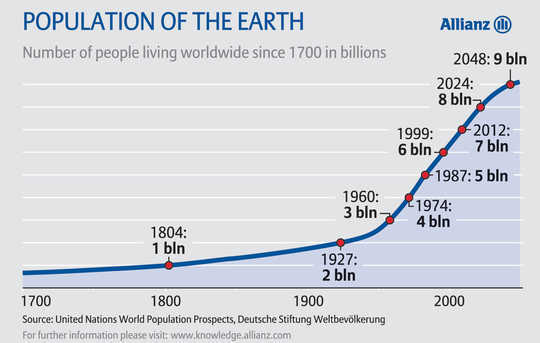
Carbon dioxide (CO2) in the atmosphere has increased dramatically along with an increase in the global temperature.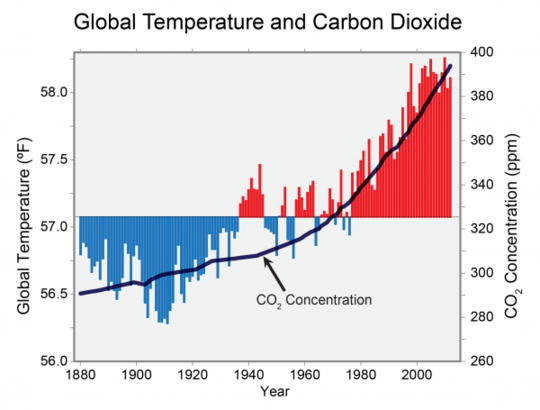
So where are we in the global temperature range? Global temperature is made up of ocean temperatures and land temperatures. And to complicate that even more, it depends on at what depth or height one measures. However, what is important in determining a trend is consistency in how and where the measurements are taken.
So where are we in the global temperature range? Well, we have to take into account the passage of time. It would be best to start at the beginning of time but hey that ain't gonna happen. We will have to use what is in the geological record, ice cores, or recorded record by man. And to that we must mesh the imprecise records as well as the more exact to determine the trend.
So where are we in the global temperature range? It's complicated and ripe for for criticism by those wanting to deceive others. Be that as it may, the trend is indisputable by the honest. Some have settled on roughly 1750 and the beginning of the industrial revolution and the mass introduction of burning coal as our measurement starting point. Others will point to 1880-1900 and the introduction of the burning of oil. Eiother way, 1980 shows a definite acceleration that something is up. One thing for sure is the lack of an agreed upon or shifting starting point is at best confusing and at worse an injection point for climate deniers to spread their nonsense and purposeful redirection away from polluters.
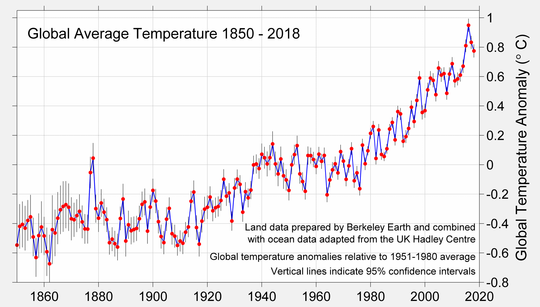
Temperature rise accelerated in the last 10 years only to back off a bit. But another surge like this could push us to 1.5C. And if one considers the year 1750 as the beginning point we must add about .3C and that pushes us over 1.5C.
Another thing to consider is the the El Niño and La Niña cycles.
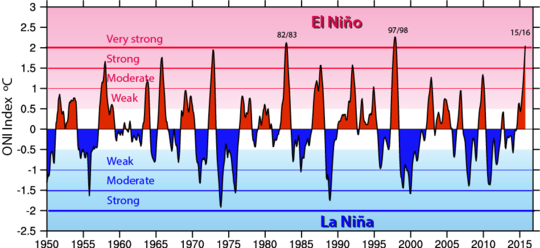
So where are we in the global temperature range? Let's throw in another wrinkle and perhaps the most important. Global temperature means average. Some areas on earth are hotter and some areas are colder. And humans do not live in a global location but a specific one.
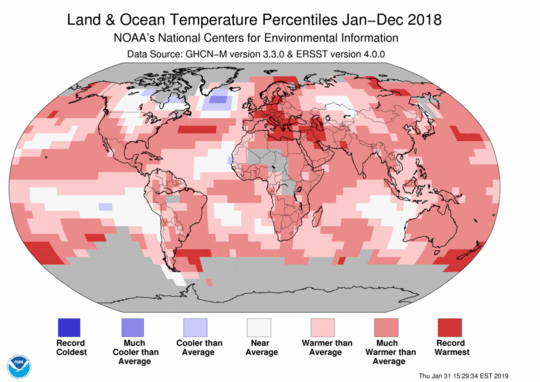
So where are we in the global temperature human livability range? So you see it's complicated. It is certainly more complicated than "rocket science". But very talented people are working on it furiously with super computers.
So if you are waiting for me to answer the question "Is Climate Catastrophe Closer Than We Think?" I can't and neither can anyone else with absolute certainty. But we are pretty sure, from the geological records when greenhouse gasses were at this level, that extinctions were increasing and life was hard. The difference between then and now is the speed the temperature is rising.
Lord Almighty, I Feel The Temperature Rising
In previous periods, these temperatures rose over thousands of years and now it is rising in only decades. At this speed, most species can not evolve to adapt. Man has managed to squeeze thousands of years of greenhouse emissions into a mere moment of time. Burning fossil fuels has enabled us to quickly multiply and emit more greenhouse gasses.
Here's what I am sure of. The IPCC has been consistently wrong to the low side. Changes to the climate and weather are happening faster than they thought. This is not at all surprising as scientists are a bit conservative. They often wait until they are absolutely sure and the evidence is indisputable. No one likes to be criticized for being wrong. Put them in a group and they are even more conservative. This ultra conservatism may be changing as new reports from the IPCC are more alarming.
Here's the rub. There is a lag in greenhouse emissions and temperature rise just like there is a lag when you turn on your oven. So if we wait until all the evidence is in it will most likely be too late. So who should we listen to for guidance?
Make no mistake, scientists and politicians are important, but some scientists are too conservative and some politicians too powerful, too irresponsible, and too greedy. So, we must look to the visionaries who seek the guidance of those that can evaluate risk and catastrophe.
Why Must We Act?
The consequences of not taking action are dire. To be wrong is to be dead in the short run, or extinct in the long run. The ultimate risk is certainly unacceptable and any effort to avoid it is certainly justified. But the methods we use and efforts we make in themselves must not create a catastrophe by trying to avoid a catastrophe.
That is why we must act both intelligently and diligently but with great haste. Now is not the time for either hair splitting, petty bickering, or analysis paralysis. Now is the time for all hands on deck, full speed ahead and damn the torpedoes to quote an old cliche that certainly applies now. And those individuals, corporations, or countries not pulling or pushing the wagon uphill need to be left at the bottom isolated until they learn to play well with others.
About the Author
 Robert Jennings is the co-publisher of InnerSelf.com, a platform dedicated to empowering individuals and fostering a more connected, equitable world. A veteran of the U.S. Marine Corps and the U.S. Army, Robert draws on his diverse life experiences, from working in real estate and construction to building InnerSelf with his wife, Marie T. Russell, to bring a practical, grounded perspective to life’s challenges. Founded in 1996, InnerSelf.com shares insights to help people make informed, meaningful choices for themselves and the planet. More than 30 years later, InnerSelf continues to inspire clarity and empowerment.
Robert Jennings is the co-publisher of InnerSelf.com, a platform dedicated to empowering individuals and fostering a more connected, equitable world. A veteran of the U.S. Marine Corps and the U.S. Army, Robert draws on his diverse life experiences, from working in real estate and construction to building InnerSelf with his wife, Marie T. Russell, to bring a practical, grounded perspective to life’s challenges. Founded in 1996, InnerSelf.com shares insights to help people make informed, meaningful choices for themselves and the planet. More than 30 years later, InnerSelf continues to inspire clarity and empowerment.
Creative Commons 4.0
This article is licensed under a Creative Commons Attribution-Share Alike 4.0 License. Attribute the author Robert Jennings, InnerSelf.com. Link back to the article This article originally appeared on InnerSelf.com
Recommended Books:
Yellowstone's Wildlife in Transition
 Over thirty experts detect worrying signs of a system under strain. They identify three overriding stressors: invasive species, private-sector development of unprotected lands, and a warming climate. Their concluding recommendations will shape the twenty-first-century discussion over how to confront these challenges, not only in American parks but for conservation areas worldwide. Highly readable and fully illustrated.
Over thirty experts detect worrying signs of a system under strain. They identify three overriding stressors: invasive species, private-sector development of unprotected lands, and a warming climate. Their concluding recommendations will shape the twenty-first-century discussion over how to confront these challenges, not only in American parks but for conservation areas worldwide. Highly readable and fully illustrated.
For more info or to order "Yellowstone's Wildlife in Transition" on Amazon.
The Energy Glut: Climate Change and the Politics of Fatness
 by Ian Roberts. Expertly tells the story of energy in society, and places 'fatness' next to climate change as manifestations of the same fundamental planetary malaise. This exciting book argues that the pulse of fossil fuel energy not only started the process of catastrophic climate change, but also propelled the average human weight distribution upwards. It offers and appraises for the reader a set of personal and political de-carbonising strategies.
by Ian Roberts. Expertly tells the story of energy in society, and places 'fatness' next to climate change as manifestations of the same fundamental planetary malaise. This exciting book argues that the pulse of fossil fuel energy not only started the process of catastrophic climate change, but also propelled the average human weight distribution upwards. It offers and appraises for the reader a set of personal and political de-carbonising strategies.
For more info or to order "The Energy Glut" on Amazon.
Last Stand: Ted Turner's Quest to Save a Troubled Planet
 by Todd Wilkinson and Ted Turner. Entrepreneur and media mogul Ted Turner calls global warming the most dire threat facing humanity, and says that the tycoons of the future will be minted in the development of green, alternative renewable energy. Through Ted Turner's eyes, we consider another way of thinking about the environment, our obligations to help others in need, and the grave challenges threatening the survival of civilization.
by Todd Wilkinson and Ted Turner. Entrepreneur and media mogul Ted Turner calls global warming the most dire threat facing humanity, and says that the tycoons of the future will be minted in the development of green, alternative renewable energy. Through Ted Turner's eyes, we consider another way of thinking about the environment, our obligations to help others in need, and the grave challenges threatening the survival of civilization.
For more info or to order "Last Stand: Ted Turner's Quest..." on Amazon.







